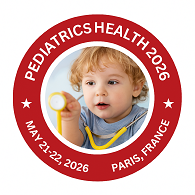About Conference
34th International Conference on Pediatrics Health invites pediatricians, researchers, healthcare professionals, and industry experts to a dynamic forum dedicated to advancing pediatric care. This prestigious event will take place in Paris, France, on May 21–22, 2026, bringing together leading minds to address pressing challenges, showcase innovative solutions, and inspire collaboration in child healthcare.
About the Conference
The conference will feature:
-
Keynote presentations by renowned experts
-
Interactive workshops and insightful panel discussions
-
Cutting-edge sessions on:
-
Neonatal care
-
Pediatric infectious diseases
-
Mental health
-
Nutrition
-
Emergency medicine
Attendees will explore advancements in vaccination strategies, chronic disease management, and emerging pediatric technologies. Designed to foster networking and knowledge-sharing, this event is ideal for medical practitioners, academic researchers, public health professionals, and industry representatives.
The program also includes poster presentations and exhibitions showcasing groundbreaking research and state-of-the-art medical devices.
Young Scientist Awards & Research Opportunities
The Pediatrics Health Virtual Meeting will honor talented young researchers, scientists, post-graduate students, post-doctoral fellows, trainees, and junior faculty for their outstanding contributions to the conference theme.
Young Researcher Awards
-
Outstanding Masters/Ph.D./Post-Doctorate thesis presentations (limited to 25 presentations)
-
Recognition certificate and memento for winners
-
Opportunities for oral presentations at Pediatrics Health 2026
-
Career development through networking with global experts
This initiative provides a platform for young researchers to exchange experiences, expand their knowledge, and gain recognition in the field of pediatrics.
Why Attend?
The 34th International Conference on Pediatrics Health is a global platform to:
-
Present your research to a worldwide audience
-
Gain recognition for your contributions
-
Network with pediatric specialists, CEOs, healthcare leaders, and industrial professionals
-
Participate in keynote sessions, symposiums, workshops, and poster presentations
-
Engage in discussions on the latest technologies and breakthroughs in pediatric healthcare
Target Audience
-
Pediatricians & Pediatric Specialists
-
Pediatric Scientists & Researchers
-
Pediatric Health Professionals & Nurses
-
Pediatric Nutritionists & Dietitians
-
Medical Colleges & Training Institutes
-
Public Health Experts & Business Entrepreneurs
-
Healthcare Associates & Policy Makers
Join us in Paris—an iconic hub of innovation and culture—as we work together to shape the future of pediatric health and ensure brighter outcomes for children worldwide.
Sessions and Tracks
1. Neonatal Care
The neonatal period is critical for ensuring the survival and long-term health of infants. Neonatal care focuses on premature babies, low birth weight, and congenital conditions. Proper management during this period reduces the risk of mortality and chronic complications. Health professionals emphasize breastfeeding, vaccination, and warmth. Regular screening helps detect metabolic and genetic disorders early. This phase sets the foundation for healthy development.
Subtracks:
-
Preterm birth management
-
Newborn screening programs
-
Kangaroo mother care
-
Neonatal jaundice management
-
Breastfeeding initiation and support
2. Pediatric Nutrition
Good nutrition is essential for children’s growth, immunity, and cognitive development. Pediatric nutrition addresses breastfeeding, complementary feeding, and nutrient deficiencies. Malnutrition in children can lead to stunted growth and increased susceptibility to infections. Balanced diets, fortified foods, and supplements are used in prevention. Education for parents plays a major role. Proper nutrition helps in preventing lifestyle diseases later in life.
Subtracks:
-
Infant and toddler feeding guidelines
-
Micronutrient supplementation
-
Childhood obesity prevention
-
Food allergies and intolerances
-
Nutrition counseling for parents
3. Pediatric Immunization
Vaccination protects children from deadly diseases and is a cornerstone of public health. Pediatric immunization schedules are designed to maximize protection at critical developmental stages. Compliance ensures herd immunity and reduces outbreak risks. Parents are educated on the importance of timely vaccinations. Emerging vaccines help combat newly identified threats. Monitoring side effects is an integral part of safety.
Subtracks:
-
National immunization schedules
-
Catch-up vaccination programs
-
Vaccine safety and side effect monitoring
-
New vaccine developments
-
Strategies to improve vaccine compliance
4. Common Childhood Infections
Children are susceptible to various infections due to developing immune systems. Common infections include respiratory tract infections, diarrheal diseases, and skin conditions. Early diagnosis and prompt treatment reduce complications. Preventive strategies include hygiene education, vaccination, and nutrition. Overuse of antibiotics is discouraged to avoid resistance. Awareness among parents is crucial for timely care.
Subtracks:
-
Respiratory tract infections
-
Diarrheal disease management
-
Skin and soft tissue infections
-
Antibiotic stewardship
-
Preventive hygiene practices
5. Pediatric Growth & Development
Tracking a child’s growth and development helps detect underlying health issues. Growth charts and developmental milestones are essential tools for clinicians. Delays can indicate nutritional, neurological, or endocrine problems. Regular check-ups ensure early intervention. Parents are educated about expected milestones. Optimal development enhances physical and cognitive outcomes.
Subtracks:
-
Growth monitoring charts
-
Developmental milestones assessment
-
Early intervention programs
-
Nutritional support for growth delays
-
Parental guidance for developmental stimulation
6. Pediatric Respiratory Disorders
Respiratory problems are among the most common pediatric conditions. Asthma, bronchiolitis, and pneumonia significantly affect child health. Management includes medications, inhalation therapy, and preventive strategies. Secondhand smoke exposure is a major risk factor. Education on home care and triggers is vital. Early diagnosis improves long-term lung function.
Subtracks:
-
Pediatric asthma management
-
Pneumonia prevention and treatment
-
Bronchiolitis care protocols
-
Impact of air pollution on child health
-
Smoking cessation support for families
7. Pediatric Cardiovascular Health
Congenital and acquired heart diseases in children require early detection and management. Regular screening can identify murmurs and structural abnormalities. Rheumatic heart disease remains prevalent in certain regions. Lifestyle interventions can prevent childhood hypertension and obesity-related heart risks. Advanced surgical techniques improve survival rates. Ongoing follow-up is essential for lifelong heart health.
Subtracks:
-
Congenital heart disease management
-
Pediatric hypertension screening
-
Rheumatic fever prevention
-
Lifestyle modifications for heart health
-
Post-surgical care for cardiac patients
8. Pediatric Endocrine Disorders
Endocrine problems affect growth, metabolism, and puberty in children. Conditions like type 1 diabetes and thyroid disorders require long-term management. Growth hormone deficiencies and precocious puberty need specialized care. Regular monitoring helps in maintaining hormonal balance. Education empowers families to manage these conditions effectively. Advances in endocrinology are improving treatment outcomes.
Subtracks:
-
Type 1 diabetes management
-
Thyroid disorders in children
-
Growth hormone therapy
-
Puberty-related endocrine issues
-
Nutritional interventions for endocrine health
9. Pediatric Mental Health
Mental health is a crucial part of pediatric care. Conditions such as ADHD, autism, and anxiety disorders affect learning and behavior. Early intervention and therapy can significantly improve quality of life. Schools and parents play a vital role in detection and support. Counseling and medication are combined when needed. Reducing stigma encourages families to seek timely help.
Subtracks:
-
ADHD assessment and therapy
-
Autism spectrum interventions
-
Anxiety and depression in children
-
School-based mental health programs
-
Parent-child counseling techniques
10. Pediatric Emergency Care
Children require specialized approaches in emergency situations. Conditions like seizures, trauma, and poisoning are commonly encountered. Pediatric life support guidelines ensure quick response. Emergency departments must be child-friendly and well-equipped. Parents are educated on first-aid basics. Rapid action often determines survival and recovery outcomes.
Subtracks:
-
Pediatric basic life support (PBLS)
-
Management of seizures
-
Trauma and fracture care
-
Poisoning and overdose protocols
-
Emergency preparedness in schools
11. Pediatric Oncology
Childhood cancers, though rare, are a significant cause of morbidity. Leukemia and brain tumors are the most common types. Early detection and chemotherapy have improved survival rates. Emotional and psychological support is crucial for both children and families. Research into less toxic treatments continues. Survivorship care includes long-term monitoring for late effects.
Subtracks:
-
Common childhood cancers
-
Chemotherapy protocols
-
Psychosocial support for families
-
Long-term follow-up and rehabilitation
-
Advances in pediatric cancer research
12. Pediatric Orthopedics
Bone and joint disorders in children require special attention due to their growth potential. Conditions include fractures, scoliosis, and developmental dysplasia of the hip. Early detection allows for less invasive treatments. Rehabilitation helps in regaining mobility and function. Parental education prevents recurrence and promotes safety. Surgical interventions are carefully timed with growth stages.
Subtracks:
-
Pediatric fracture management
-
Scoliosis screening and treatment
-
Clubfoot correction
-
Hip dysplasia interventions
-
Physical therapy for children
13. Pediatric Dermatology
Skin conditions are common in children due to sensitive skin. Eczema, allergies, and infections are frequently encountered. Prevention focuses on proper skincare and avoiding irritants. Treatment includes topical and oral therapies. Education reduces misuse of steroids and harmful products. Early care prevents chronic issues.
Subtracks:
-
Atopic dermatitis management
-
Pediatric acne care
-
Skin infection treatments
-
Sun protection for children
-
Allergy testing and avoidance
14. Pediatric Nephrology
Kidney health in children is vital for overall growth. Common issues include urinary tract infections and congenital abnormalities. Early detection prevents progression to chronic kidney disease. Hydration and proper hygiene play preventive roles. Dialysis and transplantation are options for severe cases. Regular monitoring ensures kidney health preservation.
Subtracks:
-
UTI management and prevention
-
Congenital kidney anomalies
-
Pediatric nephrotic syndrome
-
Dialysis in children
-
Kidney-friendly diets for pediatrics
15. Pediatric Gastroenterology
Digestive disorders in children affect nutrition and growth. Common problems include reflux, celiac disease, and constipation. Dietary interventions often play a major role. Early detection of chronic diseases like Crohn’s is essential. Parental guidance on feeding practices helps reduce issues. Long-term care focuses on gut health restoration.
Subtracks:
-
Pediatric GERD management
-
Celiac disease screening
-
Chronic constipation treatment
-
Probiotics in pediatric health
-
Feeding practices for digestive wellness
16. Pediatric Rheumatology
Autoimmune and musculoskeletal conditions can present early in life. Juvenile idiopathic arthritis is the most common. Early diagnosis prevents long-term joint damage. Physical therapy and medication form the mainstay of treatment. Awareness among parents speeds up referrals. Advances in biologic therapies offer better outcomes.
Subtracks:
-
Juvenile idiopathic arthritis care
-
Pediatric lupus management
-
Physical therapy techniques
-
Biologic therapies in children
-
Pain management strategies
17. Pediatric Ophthalmology
Eye health in children affects academic performance and development. Conditions include refractive errors, amblyopia, and congenital cataracts. Early screening in schools improves outcomes. Treatment includes corrective lenses, patching, and surgeries. Parents are advised to monitor screen time. Preventive care reduces long-term visual impairment.
Subtracks:
-
Vision screening in schools
-
Amblyopia therapy
-
Pediatric cataract surgery
-
Screen time recommendations
-
Eye safety education
18. Pediatric Otolaryngology (ENT)
ENT issues are frequent in early childhood. Common conditions include ear infections, tonsillitis, and sleep apnea. Early intervention prevents speech and hearing delays. Surgical options like tonsillectomy may be necessary. Parental awareness about noise exposure is important. Preventive measures improve hearing health.
Subtracks:
-
Recurrent ear infection management
-
Tonsil and adenoid disorders
-
Pediatric sleep apnea treatment
-
Noise-induced hearing loss prevention
-
Speech and hearing therapy referrals
19. Pediatric Oral Health
Oral hygiene impacts overall pediatric health. Dental caries remain highly prevalent. Preventive strategies include fluoride use and routine check-ups. Diet plays a significant role in dental health. Early correction of malocclusion improves facial growth. Education on proper brushing and flossing is crucial.
Subtracks:
-
Fluoride application in children
-
Early cavity prevention programs
-
Malocclusion and braces
-
Sugar intake reduction
-
Pediatric dental hygiene education
20. Pediatric Preventive Care
Preventive health ensures long-term wellness in children. It includes vaccinations, growth monitoring, and health education. Early interventions reduce disease burden in adulthood. Screening for developmental and behavioral disorders is part of this care. Parents play an active role in preventive strategies. Schools contribute through health-promoting programs.
Subtracks:
-
Routine pediatric screenings
-
Parental health education
-
School health programs
-
Lifestyle modification guidance
-
Early detection of risk factors
Market Analysis
The 34th International Conference on Pediatrics Health has become an essential event for pediatricians, healthcare professionals, researchers, policymakers, and industry stakeholders worldwide. From 2020 to 2030, the demand for pediatric healthcare conferences has grown due to increasing healthcare needs, global health challenges, and advancements in medical research and technology. This report explores the global market trends, drivers, and forecasts for this conference series. The pediatric healthcare conference market has experienced steady growth, driven by a rising focus on child health, prevention of childhood diseases, and advancements in diagnostics and therapeutics. The market's value stood at approximately $1.2 billion in 2020 and is projected to reach $2.4 billion by 2030, with a compound annual growth rate (CAGR) of 6.5%. Hybrid conference models (a mix of in-person and virtual events) gained prominence during the COVID-19 pandemic, increasing accessibility and participation globally. This trend is expected to continue as conferences adapt to evolving technological capabilities and audience preferences.
North America
North America dominates the pediatric healthcare conference market with a 35% share due to its advanced healthcare infrastructure, substantial research funding, and focus on rare diseases and genetic disorders. Topics such as pediatric oncology, telemedicine, and nutrition draw significant interest.
Europe contributes 25% to the market, with major engagement from countries like Germany, the UK, and France. Priorities include pediatric nutrition, mental health, and autoimmune disorders. European institutions emphasize global collaborations and cutting-edge research.
Asia-Pacific
The Asia-Pacific region is the fastest-growing market, with a CAGR of 7% from 2020 to 2030. Countries like China, India, and Japan are investing heavily in healthcare research and infrastructure. Conferences in this region address issues like infectious diseases, malnutrition, and access to care for underserved populations.
Middle East and Africa
Although representing a smaller market share, participation from these regions has steadily increased. Challenges such as healthcare disparities, high birth rates, and limited pediatric resources drive interest in conferences addressing critical pediatric health issues.
Latin America
Countries like Brazil, Mexico, and Argentina are emerging participants in the pediatric conference landscape. Topics such as vaccination strategies, obesity prevention, and asthma management are of high interest.
The 34th International Conference on Pediatrics Health is set to play a pivotal role in global pediatric care, driving innovation, collaboration, and impactful solutions. With growing demand across regions, particularly in Asia-Pacific and Europe, the conference is poised for long-term growth and influence.
Group Discount
Unlock Exclusive Savings with Our Group Discount!
Join us for the 34th International Conference on Pediatrics Health and take advantage of our special group registration offer designed exclusively for teams and institutions.
Offer Highlights:
-
Discount: Enjoy an impressive 30% off the total registration fee.
-
Eligibility: Applicable for groups of 5 or more participants.
-
Early Bird Deadline: Offer valid until October 28, 2025.
Whether you're part of an academic institution, hospital, clinical research team, or pediatric healthcare organization, this is your opportunity to attend at a reduced rate and engage in transformative discussions shaping the future of pediatrics.
Participate in inspiring sessions, connect with global experts, and showcase your expertise in Paris—Europe’s hub for medical innovation and child health!
To register your group or learn more, visit the official Pediatrics Health 2026 website.
Collaborate, Innovate, and Advance—Together in Paris!
Secure your group’s spot today!
CME Credits
CME Credits – Continuing Medical Education
Continuing Medical Education (CME) plays a critical role in the ongoing development of medical professionals, ensuring that they remain current with the latest innovations, clinical practices, and technologies. Conference Series is proud to organize CME-accredited conferences recognized by the Accreditation Council for Continuing Medical Education (ACCME).
Why Attend for CME Credits?
-
Maintain and renew your medical license
-
Stay up-to-date with emerging treatments and technologies
-
Enhance clinical practice and patient care
-
Gain recognition and distinction through speaking opportunities
-
Network with global medical experts and thought leaders
CE Credits – Continuing Education
Continuing Education (CE) credits are essential for professionals seeking to maintain and improve their qualifications across diverse fields including healthcare, research, and clinical practice. CE-accredited sessions at this conference provide hands-on learning and industry insights.
Benefits of CE Credits:
-
Strengthen your career path and job prospects
-
Stay informed with the latest research and innovations
-
Fulfill licensing and certification requirements
-
Network with professionals and recruiters in your field
-
Ideal for medical and clinical researchers, educators, and practitioners
CPD Credits – Continuing Professional Development
CPD (Continuing Professional Development) represents a structured approach to learning that helps professionals enhance their knowledge, skills, and personal qualities throughout their careers. This conference offers CPD-certified content aligned with international educational standards.
Advantages of CPD Accreditation:
-
Demonstrate commitment to personal and professional growth
-
Enhance employability and career progression
-
Fill skill gaps and improve efficiency
-
Boost confidence and professional credibility
-
Earn CPD hours through education, research, leadership, and more
Important Note:
We are pleased to inform you that participants of the 34th International Conference on Pediatrics Health will be eligible to earn CME/CPD credits. The number of credits will be announced closer to the conference date and will be based on active participation and session attendance.











